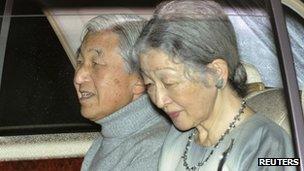Japan's Emperor Akihito leaves Tokyo hospital
- Published

Emperor Akihito was accompanied by his wife on his way to hospital
Japan's Emperor Akihito has been discharged from the Tokyo hospital he was admitted to 18 days ago for mild bronchial pneumonia.
The emperor, 78 next month, initially suffered from a cold, high fever and had symptoms of bronchitis, the Imperial Household Agency said.
Crown Prince Naruhito took over his official duties while he was ill.
Emperor Akihito ascended to the throne after the death of his father Emperor Hirohito in 1989.
Palace officials said Emperor Akihito would resume his duties as soon as his health allowed.
The emperor was taken to the University of Tokyo Hospital earlier this month.
His initial week-long stay was extended with a temperature running as high as 39C (102F) and a persistent cough.
He was later diagnosed as suffering mild bronchial pneumonia with prolonged bronchitis.
Earlier this year, after the devastating earthquake and tsunami struck the main island of Honshu, Emperor Akihito made a rare public televised address; the following month, he and Empress Michiko, 77, travelled to the disaster area.
Emperor Akihito had surgery for prostate cancer in 2003 and suffered stress-related health issues in late 2008, including an irregular pulse and stomach bleeding.
The following year, the royal agency said he would cut back on official duties such as speeches and meeting foreign dignitaries.
As the titular head of state, he plays a largely ceremonial role, but is held in deep respect by many Japanese.
- Published6 November 2011
- Published27 April 2011
- Published16 March 2011